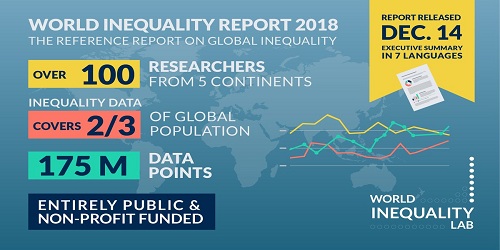According to World Inequality Report 2018 released by World Inequality Lab, deregulation and related economic reforms in India since 1980s have led to significant increase in inequality.
About ‘World Inequality Lab’ and ‘World Inequality Report’:
World Inequality Report 2018 has been prepared by researchers and project officer of World Inequality Lab based at the Paris School of Economics.
- It was coordinated by economists Facundo Alvaredo, Thomas Piketty, Lucas Chancel, Emmanuel Saez and Gabriel Zucman.
- The report presents new findings and research analysis on inequality across the world, derived from an extensive database.
- World Inequality Report 2018 is the inaugural edition of this report.
- World Inequality Lab will now publish this report on biannual basis.
Highlights of World Inequality Report 2018:
As per the report, since 1980s inequality in India increased to such an extent that top 0.1% of earners have captured more growth than all those in the bottom 50% combined.

- In 2014, India’s top 1% of earners grabbed 22% share of national income, while bottom 50% managed to get only 15% share.
- This rising inequality in India is in contrasts to the situation in 30 years following independence. During that 30 year period from independence, income inequality widely reduced and the incomes of the bottom 50% surged at a faster pace than the national average.
- Globally, since 1980, richest 1% earners have captured twice as much as the poorest 50% of world population. The report has attributed this rise inequality to the privatisation trend.
- The report has raised an alarm that by 2050, wealth of world’s 0.1% richest (representing 7.5 million individuals today) will be equal to that of the middle class (3 billion individuals).
- It has been recommended that education, wage policies and corporate governance should be reassessed in many countries of the world.
AffairsCloud Recommends Oliveboard Mock Test
AffairsCloud Ebook - Support Us to Grow
Govt Jobs by Category
Bank Jobs Notification

